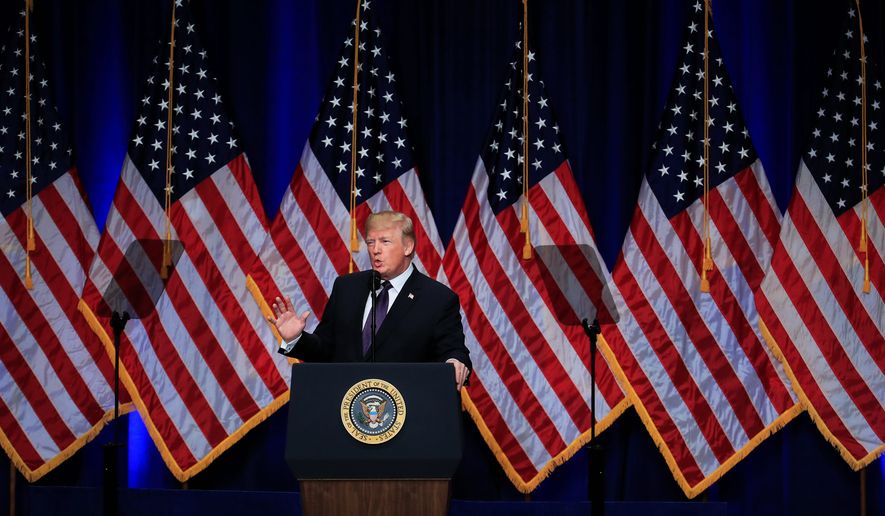President Trump’s new national security blueprint labeling Russia and China “strategic competitors” struck a nerve in Moscow and Beijing, with both criticizing the “America First” approach as isolationist and reminiscent of Cold War-style posturing by Washington.
A day after the new blueprint’s release, a Kremlin spokesman said Russian leaders were struck by its “imperialist character,” while the Chinese government called it “completely selfish for a country to claim that its own interests are superior to the interests of other[s].”
“This mentality will only lead to isolation,” said a statement posted on the website of China’s embassy in Washington. “On the one hand, the U.S. government claims that it is attempting to build a great partnership with China. On the other hand, it labels China as a rival.”
“[This] self-contradictory rhetoric,” the statement added, “betrays the truth that China and the U.S. are becoming increasingly interdependent and have growing intertwined interests.”
In announcing his new strategy Monday, Mr. Trump offered a range of broad-brush themes, stressing a focus on rebuilding the U.S. military to promote “peace through strength,” and asserting that “America is in the game, and America is going to win.”
With regard to China and Russia, the president stuck to broad points in his public remarks, describing the two as “rival powers” challenging “American influence, values and wealth.” While he expressed a desire to “build a great partnership with those and other countries,” Mr. Trump stressed it will only be done “in a manner that always protects our national interest.”
The actual national security blueprint released by the White House used notably stronger language, expressing frustration toward both Moscow and Beijing on grounds that both “want to shape a world antithetical to U.S. values and interests.”
“China seeks to displace the United States in the Indo-Pacific region, expand the reaches of its state-driven economic model, and reorder the region in its favor,” the document said. “Russia seeks to restore its great power status and establish spheres of influence near its borders.”
While it made no specific mention of Kremlin-backed meddling in last year’s U.S. presidential election, the strategy document said that “through modernized forms of subversive tactics, Russia interferes in the domestic political affairs of countries around the world.”
But the strategy blueprint also noted that neither Russia’s nor China’s intentions are “necessarily fixed,” and that the U.S. “stands ready to cooperate.”
Kremlin spokesman Dmitry Peskov suggested the government of Russian President Vladimir Putin appreciated the nuanced language.
Mr. Peskov told reporters in Moscow that the document’s “imperialistic character” showed the Trump administration’s “unwillingness to give up the idea of a unipolar world,” according to the Reuters news agency.
While he added that Moscow could “not agree with an attitude that sees our country as a threat,” the Kremlin spokesman also said there were “some modestly positive aspects” in the blueprint, “in particular, the readiness to cooperate in areas that correspond to American interests.”
But some in Moscow focused on the charges of Russian interference. Leonid Slutsky, a right-wing member of parliament in Moscow, described it as a “hollow” attempt to put Russia “on one axis with North Korea.” Mr. Trump’s “strategy is aimed exclusively at the restoration of American hegemony,” Mr. Slutsky told RIA Novosti, according to the Kremlin-backed RT network.
RT also said lawmaker Konstantin Kosachev, a member of the pro-Putin United Russia party who has long chaired the Foreign Relations Committee, expressed similar view on Facebook.
“The tone of this document leaves no doubt about the fact that the United States is not content with the changes that have taken place in the world over the past years and that it intends to reverse these changes,” Mr. Kosachev wrote. “What the U.S. means by stability is its control over the domestic and foreign policy of other nations.”
The Chinese embraced a similarly circumspect posture on Tuesday. “We call on the United States to abandon its outdated zero-sum thinking, and work together with China to seek common ground and engage in win-win cooperation,” said the statement posted by China’s embassy in Washington.
“For China and the United States, cooperation leads to win-win outcomes, while confrontation can only lead to a lose-lose situation,” the statement said. “This is a simple truth that will not change. [The U.S.] needs to get used to and get along with a developing China.”
• Dave Boyer contributed to this report.
• Guy Taylor can be reached at gtaylor@washingtontimes.com.




Please read our comment policy before commenting.